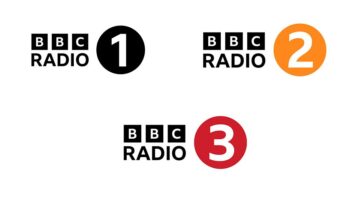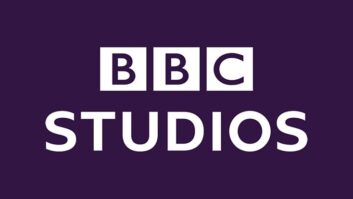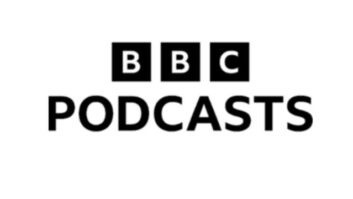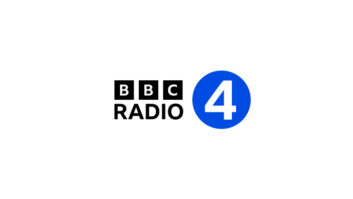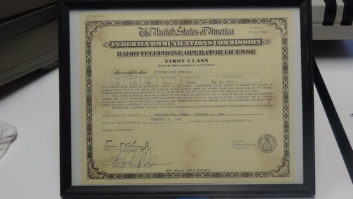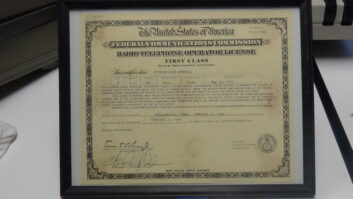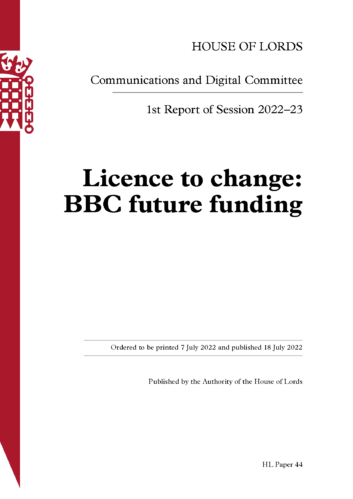
Brits should continue to pay an annual license fee to support the BBC, but the public broadcaster must develop a bold vision for the future to ensure the public remains convinced of the value it provides. This recommendation comes in the British House of Lords’ Communications and Digital Committee’s report “Licence to Change: BBC Future Funding,” released on July 18.
Notably, the committee rejected outright replacing the license fee with advertising. “Substituting the licence fee entirely for advertising would provide insufficient income whilst decimating the revenues of other public service broadcasters. A full subscription-based model would likewise deliver inadequate revenues and face major technical hurdles and accessibility barriers,” stated the report’s summary. The committee also rejected shifting to an outright governmental grant over concerns about infringing upon the BBC’s editorial independence.
The BBC’s current Royal Charter was granted in 2016 and runs through 2027. The charter renewal process sets out the public purposes of the BBC, guarantees its independence, and outlines the duties of the BBC Trust and its Executive Board.
Although focused on the future of the BBC, the report looked broadly at the United Kingdom’s evolving mediascape. In considering whether or not conditional access technology could create a viable funding stream for the BBC, the Lords looked at the potential for transitioning away form broadcast technologies to IP-based distribution.
[Related: “British Government Freezes TV License Fee”]
In the inquiry that informed the report, the Lords committee heard from industry experts that the infrastructure needed to replace broadcast with IP-delivered services would not be in place until the early 2030s. Even then, remote and rural areas would not receive the same level of service provided by broadcast. Additional concerns were noted about the cost of such services and the hardware to access them, as well as the accessibility of such technologies, particularly for older Britons.
Looking specifically at the future of radio, the committee noted that while DAB currently accounts for 33% of British radio listening, analog AM/FM radio remains the primary technology for 23% of listening. It also noted that developing conditional access technology for analog radio was not technically feasible and the cost of developing it for DAB (including replacement of existing receivers with subscription-compatible ones) would be cost prohibitive.
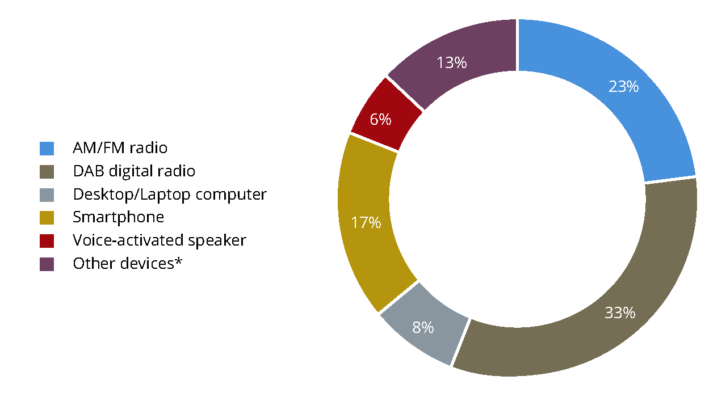
for all adults. From Digital Radio and Audio Review (October 2021)
In the end, the Lords report acknowledged that new or improved revenue sources were needed for the BBC and that a hybrid license fee–subscription system might be achievable in the longer term future, but that more work needed to be done by the government and the broadcaster to ensure that the public value would be ensured.
“The BBC should publish a comprehensive long-term vision that sets out its role, and how it will deliver value and distinctiveness in a rapidly changing world. This vision must include costed options for future funding mechanisms, and how these would affect the BBC’s ability to deliver on its mission in the next decade and beyond,” noted the report. It also warned, however, that “The legitimacy of a future funding model risks being undermined by dissatisfied audiences and declining viewing share.”
It also noted that Ofcom’s proposal to update the BBC’s operating license would give the broadcaster needed flexibility. In late June, Ofcom opened a consultation process around its proposal, which would provide more oversight of the BBC’s online platforms and revise programming requirement quotas.
Transmission services provider Arqiva recently launched the Broadcast 2040+ campaign to encourage the British government to commit to supporting over-the-air broadcasting well into the future. Arqiva CEO Shuja Khan responded to the Lords’ committee report welcoming its acknowledgement of the significance of over-the-air broadcasting, and digital terrestrial television in particular, to the public.
“Research shows that the public wants to see continued support for DTT, which is particularly important for vulnerable groups, including older people, as well as those in rural areas,” stated Khan. “We look forward to continuing to work with the Committee in the months ahead as they build on the outcomes of their inquiry.”





